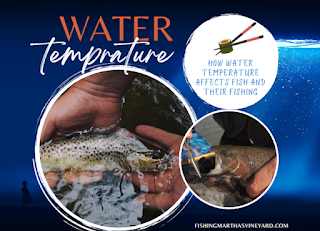How Water Temperature Affects Fish And Their Fishing
Water temperature can have a big effect on fish and fisheries , but as a fisherman it is worth understanding, at least to some degree, how changes in water temperature affect fish eating habits and, ultimately, health. of the fish.
 |
| How Water Temperature Affects Fish And Their Fishing |
Water temperature has a big effect on the lives of fish in our rivers, lakes and canals. It affects their ability to grow, feed, reproduce, and chasing cooler water in summer and warmer in winter will also affect where you’ll find them.
Within certain limits, the colder it is, the slower freshwater fish are able to digest food and their metabolic rate slows down. Many species of freshwater fish eat very little during prolonged periods of cold.
 |
| How Water Temperature Affects Fish And Their Fishing |
Fish don’t like extreme temperature changes either, they prefer consistent and gradual temperatures, just a violent cold snap or sudden heat wave is unlikely to be a good time for fishing. Look for a period of stable weather and consistent temperatures over the number of days and you could have an unforgettable fishing trip!
The water temperature will also dictate where the fish decide to congregate; in cold water conditions fish look for warmer water which can often be in deeper sections and in deep rivers central areas of cities are often warmer than countryside.
In summer, fish look for fresher, better oxygenated water and shade, so riparian areas with overhanging trees and dams are obvious retention points.
As the temperature rises, fish are able to digest food faster, have more energy, and eat more often. Thus, the fish become more active and are generally easier to catch.
However, there is a limit, as temperatures increase, the amount of dissolved oxygen in the water decreases. This factor is often compounded by the fact that river and lake levels often drop in summer, which means there is less physical water for fish to live in and shallow waters heat up more quickly.
The combination of low water levels and high temperatures can also make fish more susceptible to disease and parasite infections, so we must be extremely careful when it comes to handling fish when fishing in hot temperatures.
 |
| How Water Temperature Affects Fish And Their Fishing |
Another factor worth considering is that, as a result of photosynthesis, aquatic plants and weeds produce oxygen during the day, but actually use oxygen from the water during the night. This means that in warm conditions, oxygen levels will be at their lowest at first light, when the air temperature can actually feel much colder. Therefore, fish caught early in the morning, especially in small weedy stagnant water fisheries, may be particularly at risk.
Different species are also more vulnerable to hot water/low oxygen levels than others, with carp and eel better able to cope with the situation and trout and salmon particularly at risk.
So what can fishermen do to help protect our fish stocks and take care of the fish we catch?
- Keep in mind that fish consume oxygen when they fight on the hook , so large fish that take a long time to pull out are particularly susceptible in warm water.
- If possible, keep fish in the water while unhooking them , this is particularly important for salmon, which can also be weighed down by spawning and can be damaged if removed completely from the water.
- Return fish quickly and support them in the water while they recover.
- Consider not targeting species like salmon and trout when the water temperature is above 19 degrees or barbels and pike when the water temperature is above 21 degrees.
- Carry a thermometer to easily check the water temperature.
- Always handle fish with wet hands and bring them back as soon as possible.
Want to know more about boat fishing in addition to professional equipment, products and accessories for fishing, diving and camping with the best cost-benefit on the market? keep visiting fishingmarthasvineyard for more information.


